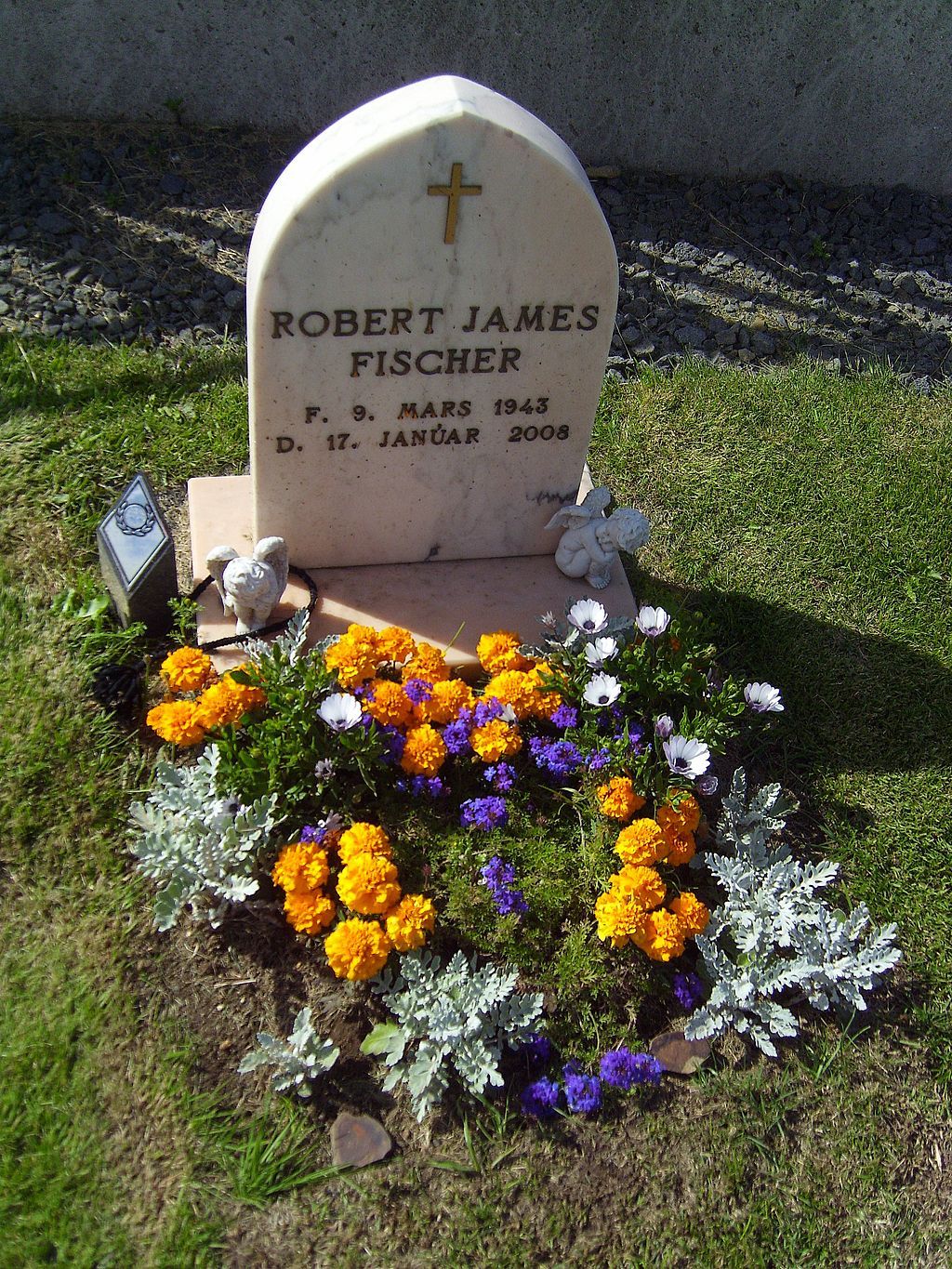GM Bobby Fischer
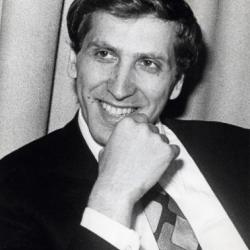
Bio
Bobby Fischer is the first and only American world chess champion in history. Many consider him to be among the greatest chess players of all time, as well as the most famous. Fischer sparked an entire generation of chess players, especially in the United States and Iceland.
His success against the Russian chess empire of the 1960s and 70s remains as one of the most incredible individual performances by any chess player. Of his most famous quotes, perhaps one of his simplest statements displays the most important and fundamental truth about the game: "Chess demands total concentration."
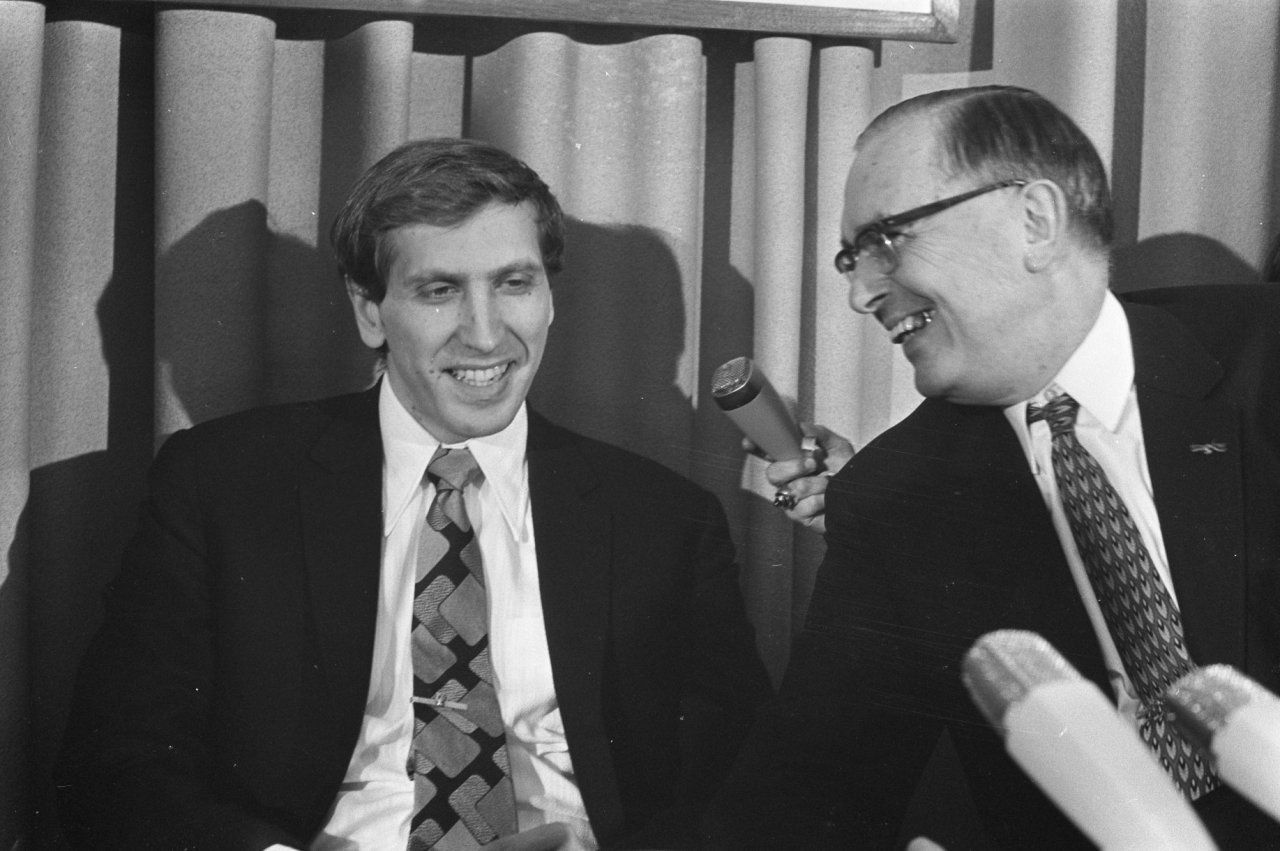
Bobby Fischer with Max Euwe in 1972. Photo: B. Verhoeff/Dutch National Archive, CC.
Early Chess Career And U.S. Champion
In 1949, Fischer's family moved to New York City when he was six years old. Fischer started playing competitive games at the Brooklyn and Hawthorne Chess Clubs, and began drawing attention from chess players nationwide. In 1956, Fischer won the U.S. Junior Chess Championships, becoming the youngest player to win the tournament at that time. The tournament win earned him a spot in the 1957 U.S. Chess Championships.
Prior to his U.S. Championship debut in 1957, Fischer would win the U.S. Open Championship, becoming the youngest-ever winner of the tournament. After defending his title as U.S. Junior Champion and winning the New Jersey Open Championship, Fischer became the youngest National Master in American history. Near the end of 1956, he played one of the most famous chess games of all time, known today as the "Game of the Century."
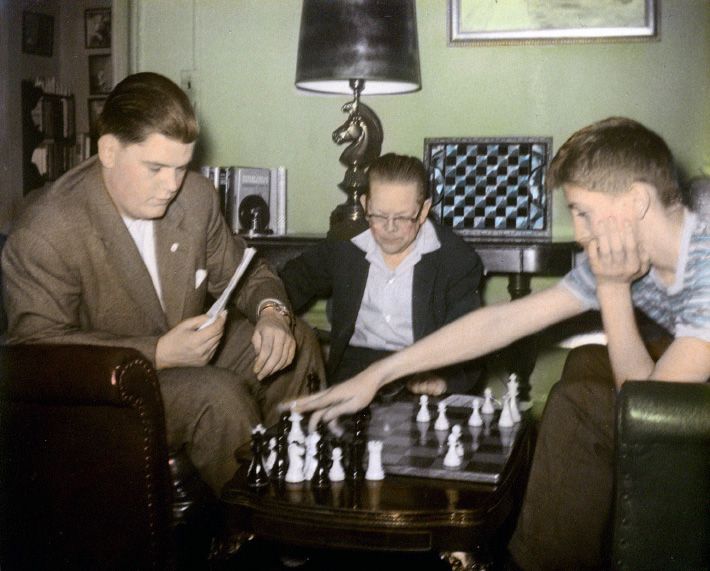
At just 14 years old, Fischer played in his first U.S. Chess Championship. Pitted against the country's best, Fischer convincingly won the tournament with a +8 score and became both the youngest U.S. champion and an international master. He would go on to win seven consecutive titles, winning each one by at least a one-point margin.
Grandmaster And World Championship Candidate
After winning a round trip to Russia in order to appear on a game show, Fischer played some matches in Yugoslavia to prepare for the 1958 Interzonal. In finishing in the top six, Fischer qualified for the Candidates tournament, becoming the youngest player at 15 years old to ever reach this stage of the world championship cycle. Qualifying for the Candidates tournament earned Fischer the grandmaster title. He would be the youngest player ever to earn the title until GM Judit Polgar broke the record in 1991.
Fischer finished fifth in the 1959 Candidates tournament and soon after dropped out of high school to devote more time to chess. In 1962, Fischer became the first non-Soviet player ever to win an Interzonal tournament and qualified for the Candidates tournament later that year. Falling short, Fischer famously accused the Soviet players of pre-arranging draws to conserve energy in the tournament.
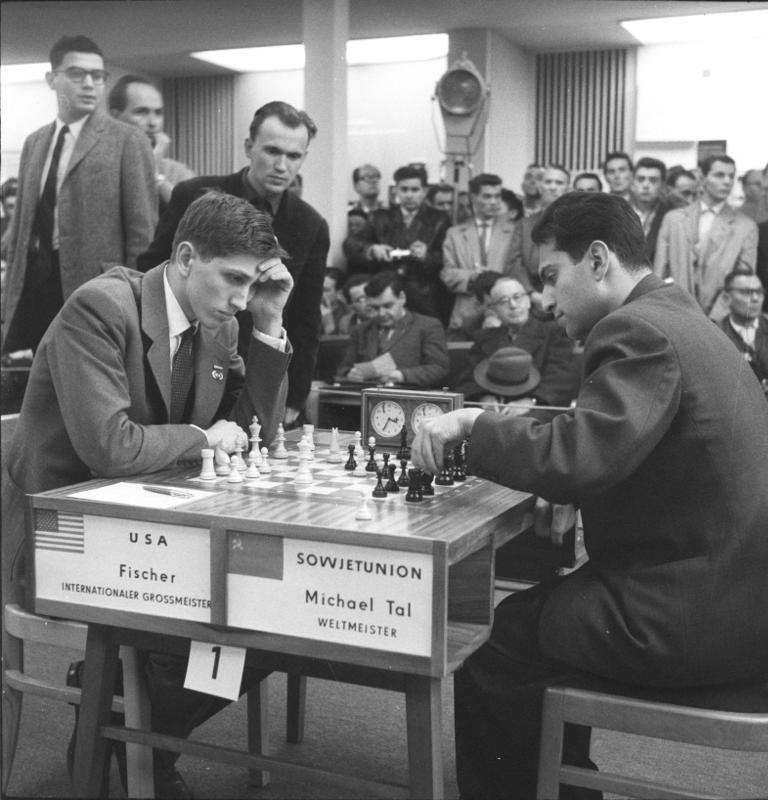
Than taking a break from Candidates qualification, Fischer won the 1963/1964 U.S. Championship with 11/11, the only perfect score in the history of the tournament. Fischer won his eighth U.S. Championship in 1966/1967. The American took a break from tournament chess in 1968 and wrote his book, My 60 Memorable Games, which is still considered one of the best chess books of all time.
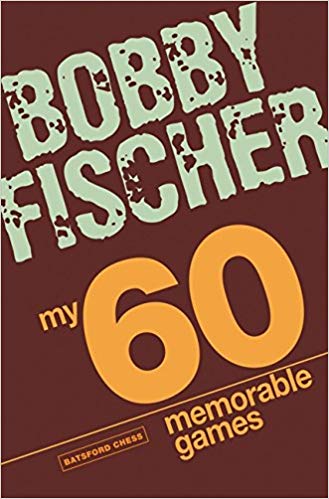
World Champion
In 1970, Fischer made his return to chess, and after closing with a seven-game winning streak, won the Interzonal tournament by a 3.5-point margin. The tournament win meant Fischer qualified for the 1971 Candidates tournament. Fischer beat GM Mark Taimanov 6-0 in the quarterfinals and then repeated the score against GM Bent Larsen in the semifinals. This twelve-game stretch is considered by many to be the best individual performance by a chess player ever.
In his final Candidates match against former world champion GM Tigran Petrosian, Fischer won the first game, amassing a total of 20 consecutive wins against elite competition. Petrosian would end the streak with the next game but would go on to lose the match, 6½–2½, which meant that Fischer had earned his spot in the 1972 World Championship Match.
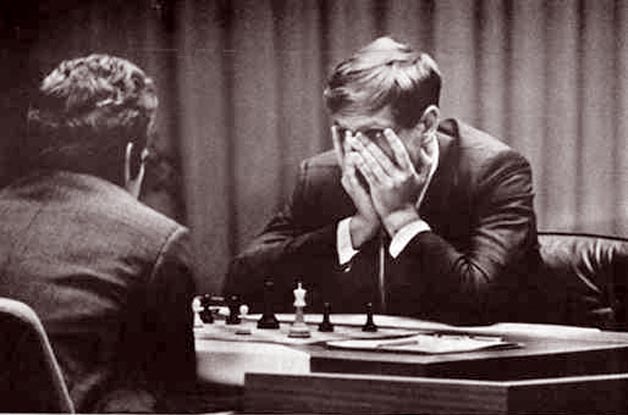
In 1972, Fischer faced World Champion GM Boris Spassky in a match publicized as a Cold War confrontation that attracted more worldwide interest than any chess championship before or since. After starting the match down 0-2 (he did not even show up to play the second game), he won an electrifying game three with an early novelty in the Benoni Defense.
Fischer went on to win game five with the black pieces and then played a positional masterpiece to win game six. Spassky himself gave Fischer a standing ovation immediately after this game.
Fischer eventually defeated Spassky by the score of 12.5-8.5 to become the 11th world champion. In 1975, the enigmatic Fischer elected not to play the match to defend his world champion title—the only world champion to do so until GM Magnus Carlsen also declined to defend in 2023. Afterward, Fischer became a recluse and disappeared from the chess scene entirely for 17 years. In 1992, Fischer won an unofficial rematch against Spassky in Yugoslavia.
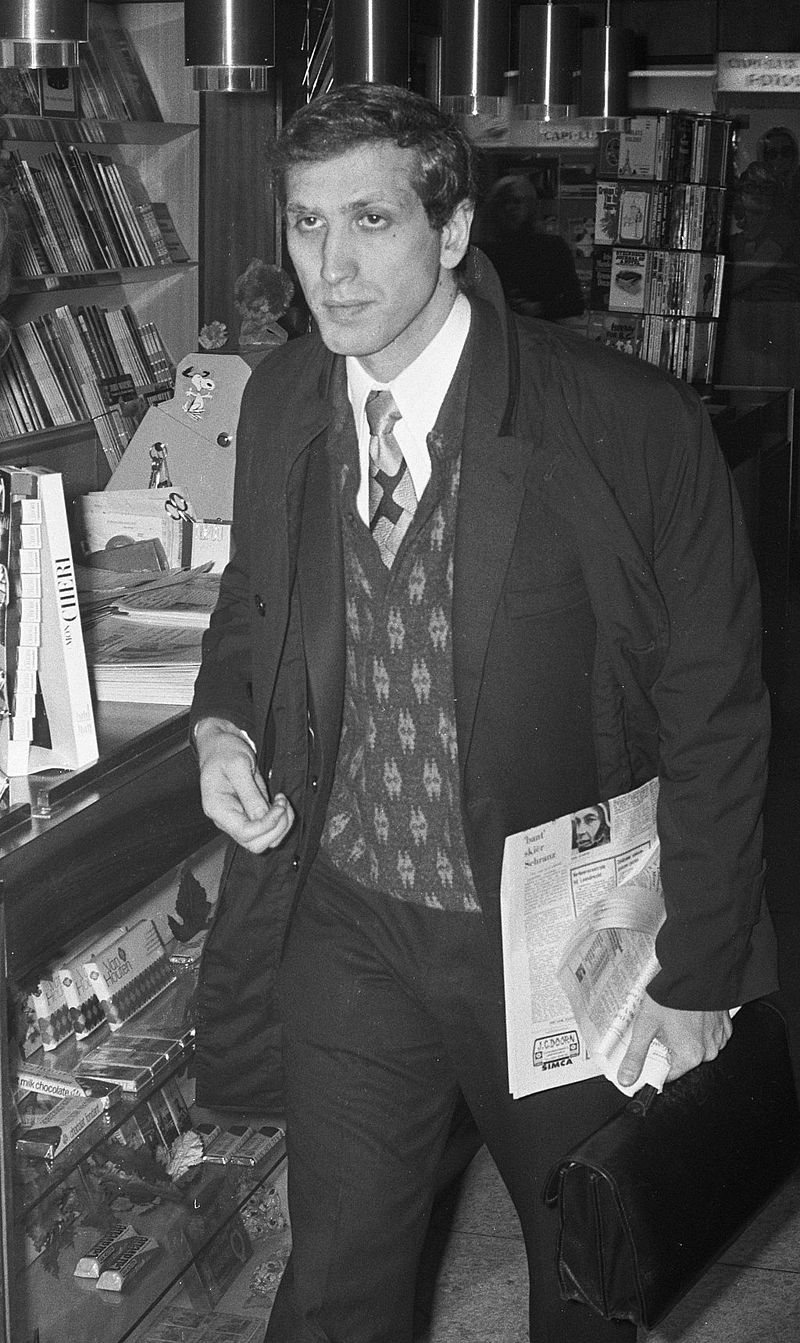
Legacy
Despite some of Fischer's incomprehensible decisions after becoming world champion, his legacy lives on today. Multiple generations of chess players either learned the game because of him or were greatly inspired by his play. Fischer has two books listed in Chess.com's top-10 chess books, and three of the seven movies listed in Chess.com's Chess Movies You Do Not Want To Miss are either about or closely related to Fischer.
Although he was known for his brilliant opening play and theoretical novelties on the biggest stages, as well as his fantastic middlegame play, his endgame play was also exceptional and well worth studying—Fischer was a complete player. Fischer, the most famous player of all time, passed away on January 17, 2008 at the age of 64, the same number of squares as on a chessboard.
